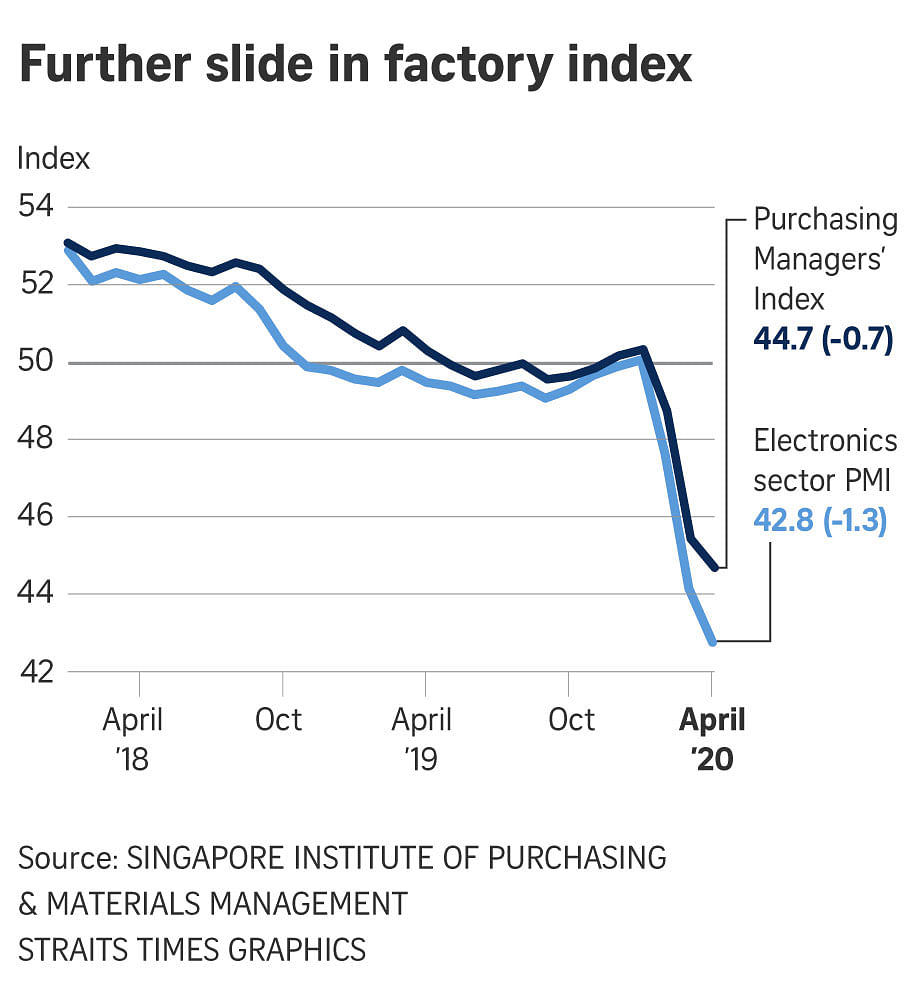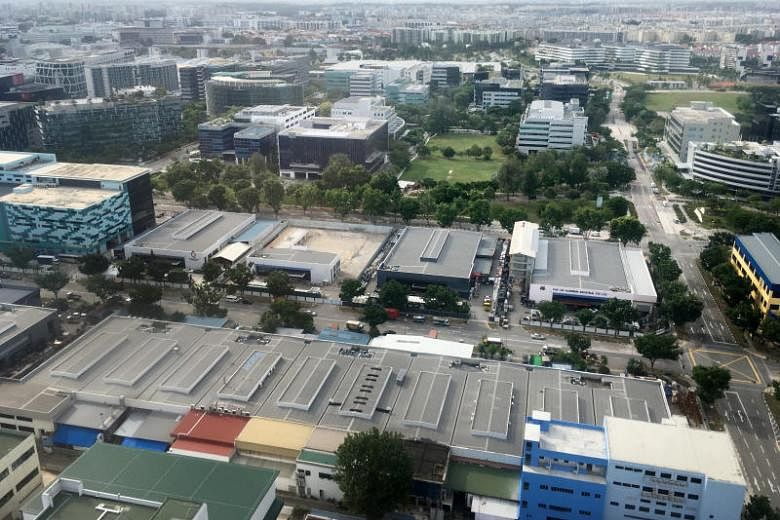SINGAPORE - A gauge of manufacturing conditions in Singapore slumped to a new 11-year low in April, as firms struggled with order cancellations as a result of global coronavirus containment measures.
The Purchasing Managers' Index (PMI) came in at 44.7 for April, down 0.7 point from March's 45.4 reading, making for a third straight month of contraction.
It is also the lowest reading since November 2008 during the global financial crisis, according to data released on Monday (May 4) by the Singapore Institute of Purchasing and Materials Management (SIPMM), which publishes the index.
A reading over 50 indicates expansion, while one below 50 points shows contraction. April's PMI came in slightly above reading of 40 forecast by analysts in a Bloomberg poll.
The electronics PMI declined 1.3 points to 42.8 in April, compared with 44.1 the previous month. It is the lowest reading since December 2008, when the electronics sector index fell to 41.8.
The electronics sector's factory output index came in at 38.3, its lowest-ever recorded reading since the PMI was launched in January 1999.
Ms Sophia Poh, vice-president of industry engagement and development at SIPMM, said: "Anecdotal evidence suggests that many manufacturers were grappling with order cancellations resulting from the global containment measures of the Covid-19 pandemic."
"The supply chain operating environment has also weakened considerably with the extension of our local circuit breaker measures that affect production capacity and responsiveness," she added.
April's overall and electronics PMI readings were weighed down by faster contractions in new orders, new exports and factory output, the SIPMM said.
However, slower contractions were recorded for employment, inventory and supplier deliveries for the overall manufacturing sector. The indexes of finished goods, input prices, and order backlog, also recorded shrank at a slower pace.
DBS Bank senior economist Irvin Seah said that April's continued PMI slide was not a surprise, given that readings in March had already fallen to an 11-year low.
"The readings were expected to be weaker due to the circuit breaker measures, which naturally would affect manufacturing companies," he said, though he noted that some clusters such as biomedical manufacturing are doing well amid the coronavirus pandemic and helping to offset the decline in other clusters.
The economists also noted the continued contraction in the employment index, as this could signal retrenchments ahead.
OCBC head of treasury research and strategy Selena Ling said the slump in the employment gauge for both the overall and electronics PMIs, "heralds impending softness for the domestic labour market".
Mr Seah said that the second quarter of the year could possibly see the bottoming out of the manufacturing downturn, with a gradual recovery to follow in the second half of the year, depending mainly on how much Singapore eases off on circuit breaker measures.

UOB economist Barnabas Gan said: "The sustained falls in both overall and electronic PMI readings reflect a further deterioration of Singapore's economic conditions."
The volatile biomedical manufacturing segment, lower oil prices, and the ongoing supply chain disruption and negative demand shocks also contribute to downside risks for the manufacturing sector, he added.
Ms Ling pointed out that the decline in Singapore's PMI readings was more muted compared with others in the region. Several South-east Asian markets saw significant plunges of more than 15 points from March to April - Indonesia's reading fell to 27.5 from 45.3 in March, while Malaysia's PMI came in at 31.3, down from 48.4 the previous month.
"It is likely that the Unity, Resilience and Solidarity Budgets amounting to $63.8 billion, with the enhancements of the Jobs Support Scheme and other credit measures to help SMEs (small and medium-sized enterprises) and workers, have helped to buffer the downside risk in terms of the economic fallout from the Covid-19 pandemic, at least for the April-May circuit breaker period," Ms Ling said.
Meanwhile, North Asian markets fared slightly better than some of Singapore's neighbours, but South Korea, Japan and Taiwan recorded their lowest readings since 2009.
While China's official estimates showed an expansion in factory activity, its firms' export orders took a dive in April, due to a collapse in external demand as a result of global containment measures.












